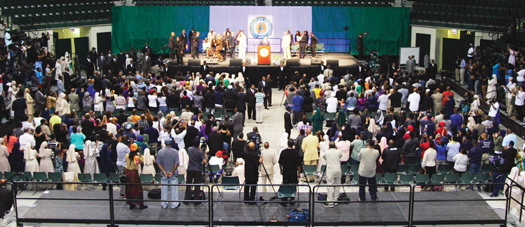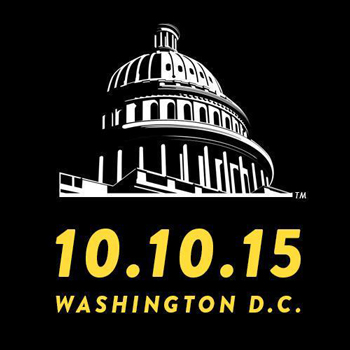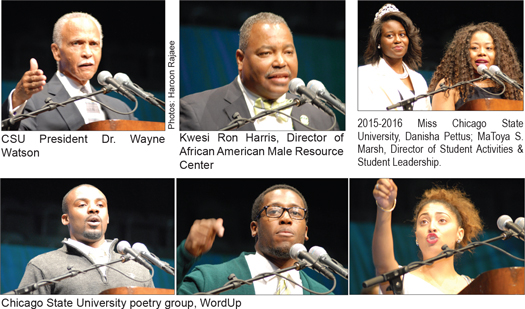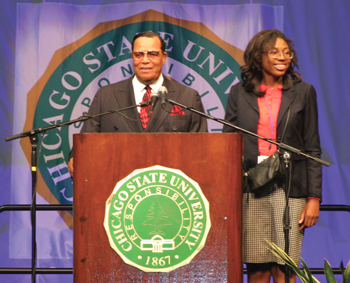-Contributing Editor-


CHICAGO (FinalCall.com) – The evening air was charged outside the Emil and Patricia Jones Convocation Center on the Chicago State University campus, not because of the intense thunderstorms that had passed and the ominous clouds that continued to threaten an otherwise comfortable evening.
The energy was produced by an electrifying message delivered to 1,700 people by the Honorable Minister Louis Farrakhan concerning the call, purpose and meaning of the upcoming Oct. 10 Justice or Else! gathering in Washington, D.C. to observe the 20th anniversary of the Million Man March.

The outspoken leader has tirelessly visited cities across the country to announce an event that, like the 1995 event, will be a defining moment in history. Unlike the gathering 20 years ago where Black men came to atone to God for their sins and to be more responsible to their families and communities, this call is for justice from an oppressive system and warning of consequences that would result in the absence of justice.
During his Sept. 17 message, the Minister answered many unspoken questions on the minds of those in attendance and he sealed further support from those who yearn for change.
“I think I’m one of them,” Kaysone Thomas, 38, of Chicago, said to The Final Call.
His response was to the Minister’s call for “10,000 fearless Black men” who would be watchmen in their communities to stand between gangs and other youth to stop the senseless violence occurring in Black neighborhoods.
It was that simple call initially made in a Miami speech that generated a vicious and calculated response from Whites through the media to misrepresent the Minister’s words, suggesting that he was calling for 10,000 Black men to kill Whites. But Black men throughout the country like Mr. Thomas waited for and received the clarity they needed.
“I think I have the mentality that Farrakhan is looking for. I think I know the streets in our community. I’m that dude that don’t fear where I come from. I’m not afraid of my people,” Mr. Thomas explained.

In his nearly three-hour message, Min. Farrakhan not only explained the call for 10,000 men, but laid out the history of abuses by Whites to people of color, why the theme of the gathering is “Justice,” and what the “Or Else!” means.
After acknowledging the presence of CSU President Wayne Watson, Min. Farrakhan called the roll of heroic Black leaders that have been vilified or even assassinated by the government. The enemy wants to keep the great leaders asleep forever in the memory of the people, he said, and the media is an important tool they use to do it.
Although Paul Robeson was celebrated in Europe, the great author, athlete and scholar was castigated in the American press and therefore rejected by many in his own community.
“He died broken hearted because the people he lived his life for didn’t know the value of his sacrifice for us,” the Minister said. “I’m honored to stand here trying to finish a work that the great ones started.
“I pray that God will give me more time because there’s much more work to be done and the Minister is no ways tired,” he said to enthusiastic applause.
Keep Black dollars at Christmas

Min. Farrakhan acknowledged that he often did not agree with Dr. Martin Luther King’s tactics. Yet he mourned the great leader’s death and asked his teacher, the Most Honorable Elijah Muhammad, how he could disagree with a man but get choked up at that man’s passing?
The Honorable Elijah Muhammad’s response, the Minister said, was, “As long as a testator lives, he or she is writing their testament.”
“Every day that I live I’m doing something else,” the Minister said. “You can’t write about a life that’s not yet fully lived. The question is, what are you doing today?”
Cheers echoed throughout the venue when Min. Farrakhan revisited Dr. King’s desire to “redistribute the pain” to America through an economic boycott of Christmas, though the people were not united enough during Dr. King’s time.
He reintroduced that call, adding that the community should not “show up on Black Friday” or throughout the holiday season. People pay more attention to Santa Claus than Jesus on the day they are supposed to celebrate Christ’s birth, he said.
The boycott plan should include demanding from large corporations a return of a portion of the dollars Blacks spend with them into a national treasury that could be used to train young people to rehabilitate abandoned homes in cities that would be donated by municipal governments.
“If they don’t feel pain there is no way they are going to change. The day after Thanksgiving, let them look for you,” the Minister said. “If you are ready, let’s boycott this madness. Let’s keep that money in our pocket.”
The 82-year-old Minister explained that the press can no longer define him thanks to social media and a Twitter and Facebook following in the hundreds of thousands. That exposure has opened doors to him being interviewed on popular hip hop radio and internet platforms.
“I thank Steve Jobs and the boys that gave us a tool to catapult over the media and the control they have over the masses,” he said.
Responding to public criticism of his associating with rap artists who have made songs that degrade women, the Minister quoted Jesus:
“Isn’t it the sick that need a doctor? The rappers are the most important and effective members of our community. These young people have enormous power all over the world. Why would you reject them? Why wouldn’t you educate them? Why wouldn’t you want to turn them in a better direction?
“I never condemn our people because they’re made in America. God don’t make niggas. Niggas are made in America. God makes a man and a woman.”

Min. Farrakhan blasted an American educational system designed to make Black students compliant to White rule and ineffective in pursuits that would empower Black communities. He acknowledged the presence on stage of Thessalonika Arzu-Embry, a CSU graduate who received her MBA degree at age 16 and has written three books.
He said the minds of young people are ready for accelerated learning but the minds of the teachers are inadequate and the motivation of colleges is to hold students as long as they can to make more money.
“This is a criminal act, to pay for something (an education) that you don’t get,” he said.
Give credit to God
The Million Man March was successful, he said, because it was a call that came from God and that he never sought credit for it.
“When God gives you an idea that comes from God, then he selected you and what is your duty? It is to never seek credit for what you did. The Qur’an says that God knows best where to place his message. The Million Man March came from God. That’s the only reason I could call for a million and two million show up,” he said.
The Minister explained that the impetus for the march started in 1985 when he had a vision-like experience where he was told about a war that then President Ronald Reagan was planning against the African nation Libya.
His assignment was to hold a press conference and announce the government’s plans and say that he got it from the Honorable Elijah Muhammad on the Wheel that the government calls a UFO.
The Minister realized, however, that the war the government planned was on two fronts–one in the international arena, the other domestically against Black youth–and for decades he has warned the people of the government’s motives.
Black communities have become cesspools where the elderly can’t walk the streets and our youth are in constant danger, he said. But sometimes it’s not the gangbangers, sometimes it’s the “rogue cops” that instigate gang disputes.
“We’re not taking this anymore,” he declared. “But nobody who is filled with self-hatred can be part of this (10,000). We love our people and we know they can be saved. That’s why we’re in the streets and we get respect from our gang leading brothers.”
Charmaine Giger, who traveled 100 miles from South Bend, Ind., with her three young children to see Min. Farrakhan for the first time, said the leader “definitely touched into my thinking.”
Referring to the Minister’s speech where he sustained the right to ask questions of God, she said, “In the wee hours of the morning I sometimes sit and wonder why we (Blacks) suffer. Why we suffer at the workplace, everywhere. Farrakhan answered a big question for me when he explained that it’s okay to question God.”
Rev. Mittie Collier of the More Like Christ Christian Fellowship Church contemplated the Minister’s explanation of the 10th chapter of Jeremiah in the Bible that speaks against the Christmas tree.
“Boycotting Christmas, fantastic,” she said. “I’ve read Jeremiah 10 before, but I’ve never gotten [what the Minister explained]. I’m going to preach that in my church and get other ministers to encourage their congregations to do the same thing. That’s the way we make them recognize us. They’ve been taking our dollars, so like he said, let them look for us.”
The Minister was invited by the African American Male Resource Center, a campus group whose mission is to provide support to Black male students to improve retention and graduation rates.
Director Kwesi Ron Harris said he wanted his students to experience a man that embodies the attributes of Marcus Garvey, Ida B. Wells and a host of other historical figures. He said he was impressed by the multi-generational audience that came to the event.
“You could tell that the Minister was being a vessel for the voices of many of those past and those to come,” Mr. Harris said.












